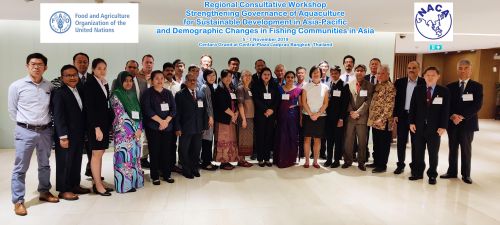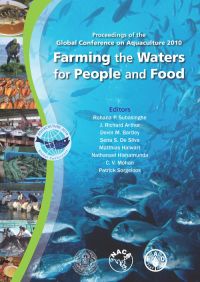Consultation on Strengthening Governance of Aquaculture for Sustainable Development in Asia-Pacific
28 January 2020 | 30305 views | Cambodia, China, Governance and Policy, India, Indonesia, Malaysia, Philippines, Thailand, Vietnam

The consultation was held from 5-6 November 2019 at the Centara Grand Hotel at Ladprao, Bangkok. It was attended by 29 participants from 15 countries in the Asia-Pacific region, and jointly organised by FAO and NACA.
The rapid development of aquaculture in Asia is only a recent phenomenon of the past a few decades. The industry is relatively new, with governance of the sector still evolving in many Asian countries in terms of development of a legislative framework and enforcement of same. Good governance is fundamental and crucially important to tackle many of the issues that impair sustainable development of aquaculture, such as negative environmental impacts, low efficiency of resource utilisation, disease and food safety.
With the increasing world population and improving living standard as the result of overall economic growth, it is estimated that an additional 30 million tonnes of food fish has to be produced by 2030 to meet the increasing consumption demand. With most wild fish stocks fully or over exploited, aquaculture growth will be the major means of meeting increasing demand for food fish. However, it will be very difficult to achieve sustainable growth of aquaculture without improving the governance.
The 35th Session of Asia-Pacific Fishery Commission has identified the lack of effective governance as a major threat to sustainable aquaculture growth for greater contribution to achievement of the Sustainable Development Goals on ending poverty and hunger and achieving food security and improved nutrition. The commission recommended to FAO that it is timely needed to conduct a regional assessment on existing laws and regulations governing aquaculture and their enforcement in the region and a regional consultation on strengthening the governance of aquaculture.
The consultation and related country review studies were therefore proposed by FAO and jointly implemented by FAO and NACA in collaboration with member governments. The objectives of the consultation were to:
- Share the results of country studies on aquaculture governance in respective countries.
- Identify gaps, issues and challenges in aquaculture governance.
- Recommend strategies and actions to improve and strengthen aquaculture governance.
Creative Commons Attribution.
